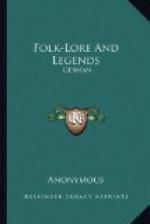“Some of your sons have been killed in the wars, I presume?” said Sir James.
“Ye hae guessed a pairt o’ my waes,” replied the woman. “That arrow” (holding out one of the three) “carries on its point the bluid o’ my first born; that is stained wi’ the stream that poured frae the heart o’ my second; and that is red wi’ the gore in which my youngest weltered, as he gae up the life that made me childless. They were a’ shot by English hands, in different armies, in different battles. I am an honest woman, and wish to return to the English what belongs to the English; but that in the same fashion in which they were sent. The Black Douglas has the strongest arm an’ the surest ee in auld Scotland; an’ wha can execute my commission better than he?”
“I do not use the bow, good woman,” replied Sir James. “I love the grasp of the dagger or the battle-axe. You must apply to some other individual to return your arrows.”
“I canna tak’ them hame again,” said the woman, laying them down at the feet of Sir James. “Ye’ll see me again on St. James’ E’en.”
The old woman departed as she said these words.
Sir James took up the arrows, and placed them in an empty quiver that lay amongst his baggage. He retired to rest, but not to sleep. The figure of the old woman and her strange request occupied his thoughts, and produced trains of meditation which ended in nothing but restlessness and disquietude. Getting up at daybreak, he met a messenger at the entrance of his tent, who informed him that Sir Thomas de Richmont, with a force of ten thousand men, had crossed the Borders, and would pass through a narrow defile, which he mentioned, where he could be attacked with great advantage. Sir James gave instant orders to march to the spot; and, with that genius for scheming, for which he was so remarkable, commanded his men to twist together the young birch-trees on either side of the passage to prevent the escape of the enemy. This finished, he concealed his archers in a hollow way, near the gorge of the pass.
The enemy came on; and when their ranks were embarrassed by the narrowness of the road, and it was impossible for the cavalry to act with effect, Sir James rushed upon them at the head of his horsemen; and the archers, suddenly discovering themselves, poured in a flight of arrows on the confused soldiers, and put the whole army to flight. In the heat of the onset, Douglas killed Sir Thomas de Richmont with his dagger.
Not long after this, Edmund de Cailon, a knight of Gascony, and Governor of Berwick, who had been heard to vaunt that he had sought the famous Black Knight, but could not find him, was returning to England, loaded with plunder, the fruit of an inroad on Teviotdale. Sir James thought it a pity that a Gascon’s vaunt should be heard unpunished in Scotland, and made long forced marches to satisfy the desire of the foreign knight, by giving him a sight of the dark




